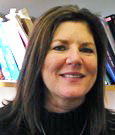Graduate Program
The Department of Sociology at Bowling Green State University offers advanced study at both the master's and doctoral levels for students who seek employment in either academic or non-academic settings.The doctoral program is ranked in the top 20 nationally in productivity by the National Research Council. With 17 full-time faculty and approximately 40 graduate students, the program features small classes and a high level of interaction between faculty and students in a friendly, informal environment that stresses excellence in both research and teaching. Faculty are accessible to students, and students are regarded as motivated junior scholars. The program offers an abundance of formal and informal opportunities to share ideas, and faculty and students regularly collaborate on research and coauthor papers presented at professional meetings and published in scholarly journals.

Our faculty includes a past President of the Population Association of America (PAA), a Sutherland Award winner (the highest honor from the American Society of Criminology) and winner of the Stockholm Prize in Criminology (the top international prize in criminology) a PAA Clifford Clogg award recipient (for outstanding mid-career scholars), a scholar named a "Top Contributor" by the Work and Family Researchers Network, an expert witness to federal cases on bail reform, an author of the American Sociological Association's (ASA) amicus brief to the Supreme Court in the landmark Obergefell v. Hodges case, among many other faculty acclaimed for their research and teaching. In addition, two federally-funded research centers, the Center for Family and Demographic Research (CFDR) and the National Center for Family & Marriage Research (NCFMR)) are housed in the department, as is the Toledo Adolescent Relationships Study (TARS).
Our graduate students are highly active in research, present their work at national sociology, demography, and criminology conferences, and often publish with faculty or independently. Students also receive formal training in the teaching of sociology and then have the opportunity to teach their own courses. Our students receive excellent mentorship and upon graduation, have been well placed in academic and non-academic settings, including R1 research departments (Florida State, Penn State, Nebraska), other universities and liberal arts colleges, government agencies (Census Bureau), think tanks (Child Trends), national research centers (National Opinion Research Center), and the private sector (Nielsen). Visit our Student Placements page for a list of placements.
To provide a broad background in general sociology and to create the capacity for the development of rigorous research, teaching, and/or applied skills in at least one area of specialization. Although faculty interests cover a wide range of sub-areas within sociology, the areas of specialization offered in the doctoral program include:
Area Faculty
- Steve Demuth
- Peggy Giordano
- Danielle Kuhl
- Tom Mowen
- Kelly Balistreri
- Susan Brown
- Wendy Manning
- Lauren Newmyer
- Laura Sanchez
- Jenjira Yahirun
- Susan Brown
- Monica Longmore
- Wendy Manning
- Lauren Newmyer
- Kei Nomaguchi
- Laura Sanchez
- Jenjira Yahirun
- Monica Longmore
- Tom Mowen
- Kei Nomaguchi
- Gary Oates
Quantitative Methods is offered as a minor area of specialization at the PhD level.
Area Faculty
- Susan Brown
- Steve Demuth
- Tom Mowen
- Gary Oates
For students interested in a terminal MA degree, we offer an additional area of concentration in applied demography.
Research Centers
The Department houses two research centers:
Learning Outcomes – Doctor of Philosophy
Upon completion of the doctoral degree, students in Sociology are expected to be able to:
- Synthesize and appraise the theoretical and empirical literature in a major area of specialization in sociology, concluding about important areas for future research.
- Develop a sociologically significant research project that investigates multiple, related research questions.
- Evaluate and defend the relevant theories and literature that inform the research project.
- Statistically analyze empirical data from large social survey datasets to investigate multiple, related research questions.
- Assess the strengths and limitations of analytical methods and to defend choices to use some methods over others.
- Argue effectively to technical and non-technical audiences orally and in writing.
Learning Outcomes – Master of Arts
Upon completion of the graduate degree, students in Sociology are expected to be able to:
- Develop a project that investigates a sociological research question.
- Evaluate and defend the relevant theories and literature that inform the research question.
- Statistically analyze empirical data from large social survey datasets to investigate a research question.
- Assess the strengths and limitations of analytical methods and defend choices to use some methods over others.
- Argue effectively to technical and non-technical audiences orally and in writing.
Accreditation and/or Program/Cluster Review
Bowling Green State University [BGSU] is accredited by the Higher Learning Commission. BGSU has been accredited by the Higher Learning Commission since 01/01/1916. The most recent reaffirmation of accreditation was received in 2022 - 2023. Questions should be directed to the Office of Institutional Effectiveness.
The Sociology program will undergo Program/Cluster Review during the Academic Year 2018/19.
Professional Licensure (If applicable)
Bowling Green State University programs leading to licensure, certification and/or endorsement, whether delivered online, face-to-face or in a blended format, satisfy the academic requirements for those credentials set forth by the State of Ohio.
Requirements for licensure, certification and/or endorsement eligibility vary greatly from one profession to another and from state to state. The Sociology program does not lead to professional licensure.
Gainful Employment (If applicable)
Under the Higher Education Act Title IV disclosure requirements, an institution must provide current and prospective students with information about each of its programs that prepares students for gainful employment in a recognized occupation.
The Sociology program is not a recognized occupation that requires a Gainful Employment disclosure.
Updated: 10/23/2025 12:20PM



